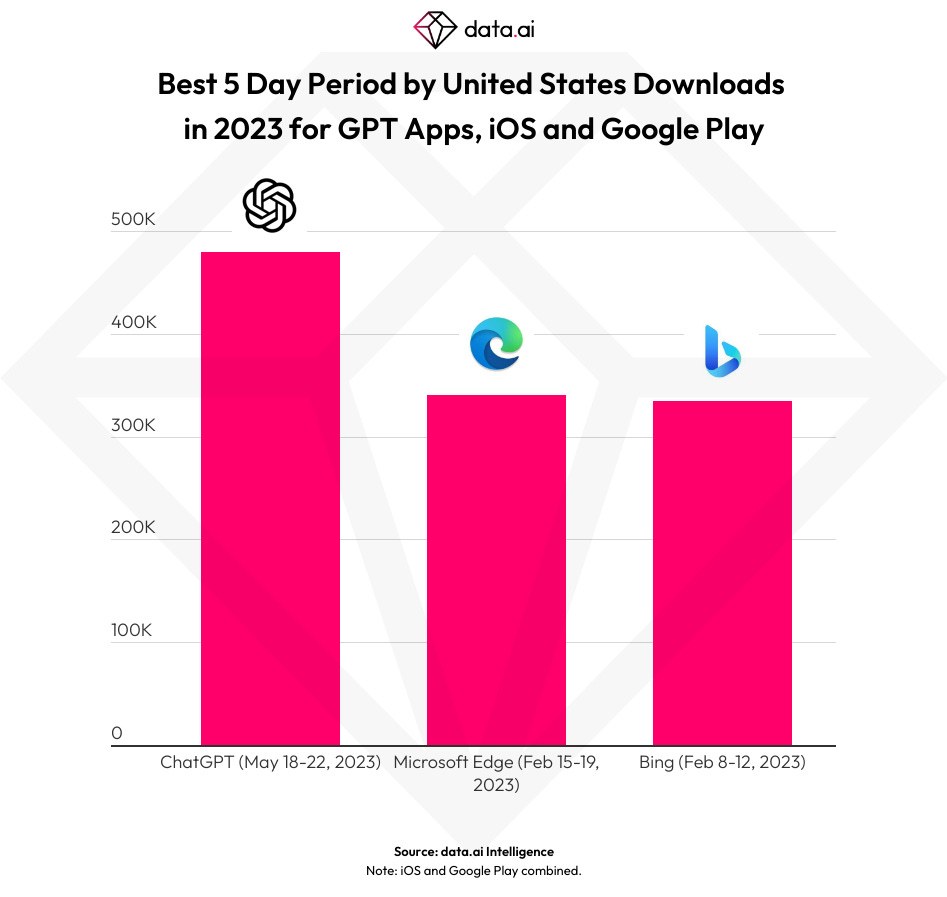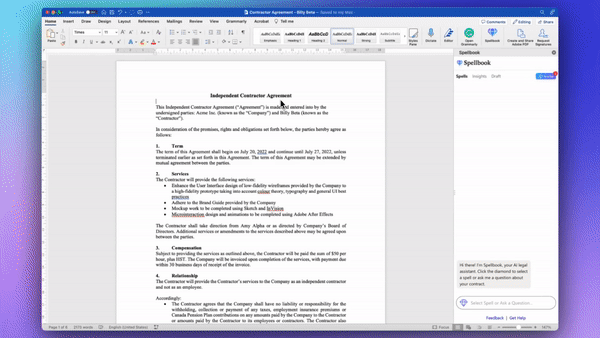GSV's AI News & Updates (05/26/22)
TikTok Tests AI Chatbot, Google's AI Search Experiment, NVIDIA Becomes a Kingmaker, Adobe Generative Fill, SAP and Microsoft's AI Skills Tools, Anthropic raises $450M, Builder.ai's $250M Series D
You are receiving this weekly update on the intersection of AI and education, as part of our GSV community – we hope this will be a helpful resource as we navigate this evolving and exciting intersection. Please feel free to send over any relevant resources you may come across (claire@gsv.com) – we’d love to learn and hear from you!
General 🚀
TikTok is testing an in-app AI chatbot called ‘Tako’: When tapped, users can ask Tako various questions about the video using natural language queries or discover new content by asking for recommendations. For instance, when watching a video of King Charles’ coronation, Tako might suggest that users ask “What is the significance of King Charles III’s coronation?” TikTok believes the chatbot could do more than just answer questions about a video — it could also become a different way for users to surface content in the app, beyond typing into a search box.
Nvidia nears a $1T market cap as it positions its chips as fuel for the AI race: the chipmaker’s stock surged 25% after it reported earnings, catapulting it to the #5 spot of highest-valued US companies. Nvidia expects revenue to be 50% higher this quarter than last as the need for AI chips soars. The video game computer chip maker has become an unlikely kingmaker thanks to the AI boom.
Nvidia’s A100 chip was already the gold standard used in LLMs that underpin AI tools (thousands of A100s were used to train OpenAI's ChatGPT).
the H100 chip, which is apparently faster and stronger than its predecessor, has orders flooding in from companies like Dell and Google.
Google is starting to let users into its AI search experiment: The most interesting feature in Labs is the Search Generative Experience, which puts an AI-generated summary at the top of search results across Google (instead of the infamous “10 blue links”). Labs is still guarded by a waitlist.
It could have huge ramifications for how people search and even what they search for. It’s going to upend the SEO industry, as everyone fights to be in the AI summary rather than in the links now pushed down below.
If users mostly get what they need from the summaries and thus don’t click off the page as often, it could change the whole business model of the web.
Two other features: Add to Sheets, which puts a button next to every link in your search results that will add that link to the Google Sheet of your choosing; and Code Tips, a large language model-based system specifically for helping you write and fix code.
Adobe Unleashes Generative AI in Photoshop Beta: Generative Fill will arrive in Photoshop in ‘the second half of 2023.’ By integrating Firefly directly into workflows as a creative co-pilot, Adobe is accelerating ideation, exploration and production.
OpenAI rolls out ChatGPT iOS app in more countries, app tops 500K installs in 6 days: they are also rolling out Share Links, which will generate a unique URL for a ChatGPT conversation, which can be shared with friends, colleagues, and collaborators (vs. the burdensome method of sharing screenshots).
Meta’s new AI models can recognize and produce speech for more than 1,000 languages: a tenfold increase on what’s currently available - there are around 7,000 languages in the world, but existing speech recognition models cover only about 100 of them comprehensively. This will help developers working in different languages to build new speech applications—like messaging services that understand everyone, or virtual-reality systems that can be used in any language.
Snowflake is acquiring Neeva: The aim is to develop AI search solutions, enabling businesses to efficiently locate internal data. Snowflake is taking a different route than Google and Microsoft, opting to acquire AI talent instead of hiring it.
Anthropic Closes $450 Million in Funding, Bringing Total Funding to $1.8 Billion: the announcement comes just two weeks after it announced an industry-leading context window of 100,000 tokens or approximately 75,000 words (Great Gatsby was uploaded with 72K tokens).
The company also stressed a different approach to AI safety: while OpenAI tends to rely on reinforcement learning from human feedback (RLHF), rule-based reward models (RBRM), and monitoring of datasets, Claude is architected with the concept of Constitutional AI.
Anthropic positions itself as both a product company and an AI safety research organization.
Former GitHub CTO Jason Warner Raises $26 Million for Foundation Model Code Startup
Education and the Future of Work 📚
SAP and Microsoft Collaborate on Joint Generative AI Offerings to Help Customers Address the Talent Gap: SAP and Microsoft will work together on new experiences that streamline recruiting and employee development processes.
fine-tune job descriptions using Copilot in Microsoft Word with additional content and checks to detect bias
offer prompts to interviewers within Microsoft Teams with suggested questions based on a candidate’s resume, the job description and similar jobs
enable employees to use Copilot in Viva Learning to conduct natural language queries to create personalized learning recommendations based on data and learning courses in SAP aligned with the employee’s career and development goals.
Microsoft 365 Copilot is coming to Microsoft Edge: You can type natural language requests like “Tell my team how we updated the product strategy today,” and Microsoft 365 Copilot will generate a status update based on the morning’s meetings, emails and chat threads. In combination with Edge, Microsoft 365 Copilot becomes even more intuitive by following the context of what you’re looking at in the browser to provide better answers.
AI Eats Therapy: what kind of an impact on our collective emotional well-being will we see when everyone has a reliable, kind, and attentive chatbot to talk to 24/7?
(upcoming event 📌) Fireside Chat with Wharton CIO: Generative AI In Education: perspective on how generative AI can maximize institution-wide potential when implemented responsibly to maintain academic integrity.
Startups and Tools 🛠️
Builder.ai, a modular AI app-building platform, raises $250M in Series D funding: designed to be so simple and accessible that everyday businesses and individuals can turn their ideas into software. They break down software into reusable lego-like features, couple it with customization from its managed expert network of designers and developers atop its human assisted AI powered assembly line.
Spellbook, an ‘AI Copilot’ for Contract Drafting in Word, Raises $10.9M from Moxxie, Thomson Reuters: Spellbook is currently being used by more than 600 legal teams, and another 53,000 potential customers have signed up for the waitlist.
Meiro: AI-powered builder for tests, quizzes and text games. Create engaging and educational content in minutes.
Tyles: an AI-driven note app that magically sorts your knowledge.
Tiimo: your virtual AI teacher.
KaryaHunt: AI-powered job search companion.
Humbird.ai: “the silver bullet” solution for proactive hiring - automate your hiring process with advanced AI capabilities to proactively attract, engage, and convert top talent.
Vidyo.ai: AI content repurposing - make short social-ready clips from long videos and content.
Webscape: your AI copilot for the web - unlock the power of context-aware AI to seamlessly access, search, and interact with your information across your workspaces.
Wudpecker: streamline your meeting prep with prebuilt templates, transcribe meetings and make every conversation searchable, outlined summary of every meeting.
AgentGPT: allows you to configure and deploy Autonomous AI agents. Name your custom AI and have it embark on any goal imaginable. It will attempt to reach the goal by thinking of tasks to do, executing them, and learning from the results.
Tech 💻
DragGAN: A New Method for Manipulating Generated Images: The technique enables one to "drag" any points of the image to precisely reach target points in a user-interactive manner.
Google DeepMind AI language model is now making descriptions for YouTube Shorts: the Flamingo visual language model is being put to work to generate descriptions, which can help with discoverability.
Goat: Fine-tuned LLaMA Outperforms GPT-4 on Arithmetic Tasks
State of GPT (video): Learn about the training pipeline of GPT assistants like ChatGPT, from tokenization to pretraining, supervised finetuning, and Reinforcement Learning from Human Feedback (RLHF).
Regulation and Policy ⚖️
OpenAI may leave the EU: as part of the EU’s draft regulations, companies deploying generative AI tools, such as ChatGPT, will have to disclose any copyrighted material used to develop their systems. AI innovation in Europe could take a hit if the AI Act restricts open-source/APIs.
Microsoft’s Brad Smith on “How do we best govern AI?”: a five-point blueprint for the public governance of AI
implement and build upon new government-led AI safety frameworks
require effective safety brakes for AI systems that control critical infrastructure
develop a broad legal
promote transparency and ensure academic and nonprofit access to AI.
pursue new public-private partnerships to use AI as an effective tool to address the inevitable societal challenges that come with new technology.
3 things businesses must do to secure applications in the AI era: new threats fueled by AI include - more sophisticated bot traffic, more believable phishing attacks, the rise of legitimate AI agents accessing customers’ online accounts on behalf of users.
Carnegie Mellon To Launch AI Institute Through $140M Federally Funded Program: Organized by the U.S. National Science Foundation (NSF) and other federal agencies, the university is one of seven to receive funding in an effort to create new “National Artificial Intelligence Research Institutes.”
seven universities were named, including the University of Maryland, the University of California, the University of Minnesota, the University of Illinois, the University at Buffalo, Columbia University, and Carnegie Mellon University (CMU).
Fun/Other 🎉
Scientists have used artificial intelligence (AI) to discover a new antibiotic that can kill a deadly species of superbug: AI helped narrow down thousands of potential chemicals to a handful that could be tested in the laboratory.







